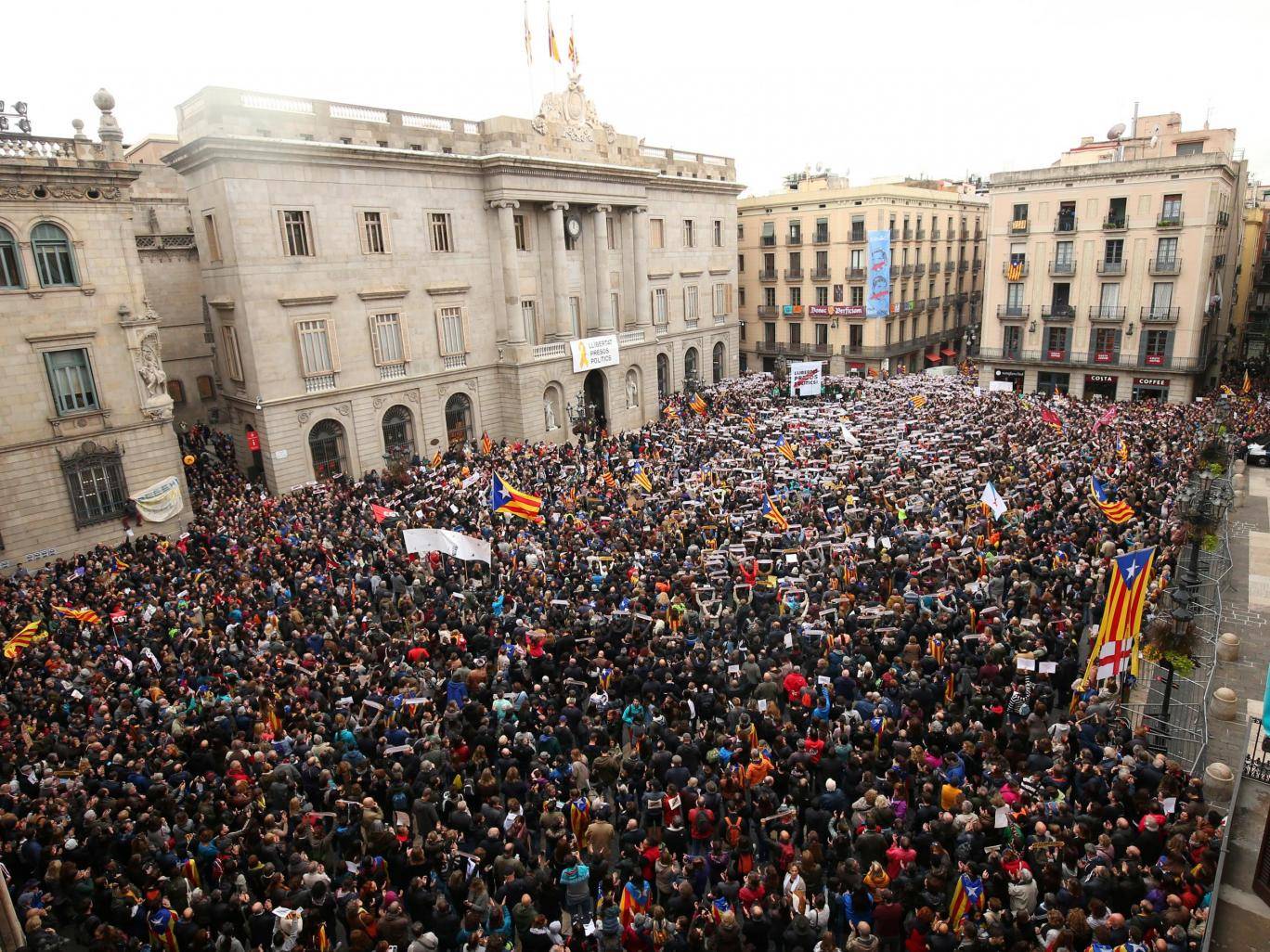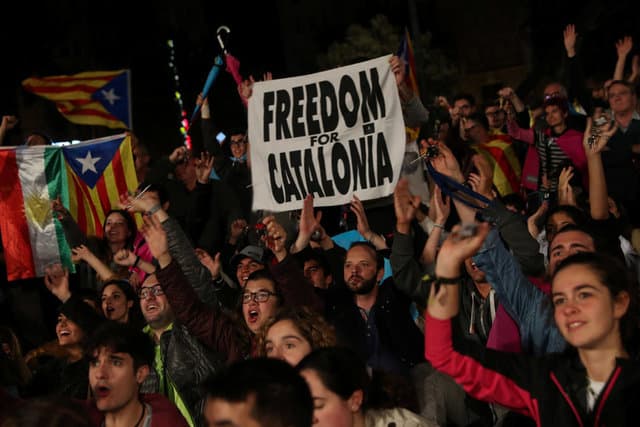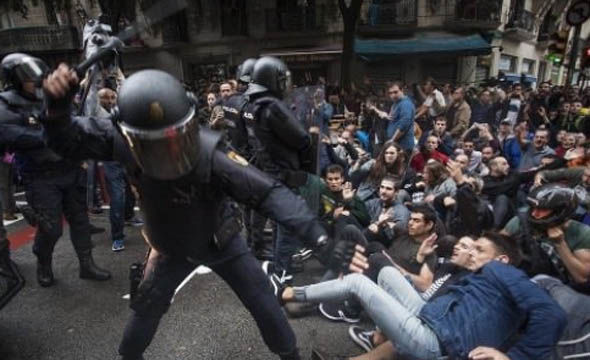
Tens of thousands of people protested yesterday in Catalonia against the detention of Catalan nationalists as political prisoners by the Spanish central government after the October 1 Catalan independence referendum.
The protest—called as a strike by the small, Catalan-separatist Intersindical-CSC union—pointed to wider opposition to the suspension of Catalonia’s elected government by Spanish Prime Minister Mariano Rajoy, and Rajoy’s moves towards authoritarian rule. It came the day after the central government took the unprecedented step of seizing control of the finances of the capital city, Madrid, to impose more austerity by fiat.
Protesters set up roadblocks in downtown Barcelona, blocked highways and high-speed train lines, and joined a large march for the freedom of Catalan nationalists Jordi Sanchez and Jordi Cuixart. Spanish police, who have received thousands of reinforcements as Rajoy’s Popular Party (PP) government imposed direct rule of Catalonia by invoking Article 155 of Spain’s 1978 Constitution, charged and assaulted protesters manning roadblocks and pickets in the city.
The protest proceeded despite a torrent of attacks from politicians, Catalan business figures, and the Spanish trade union bureaucracy and the stepped-up police presence across Catalonia. The Catalan Foment del Traball business federation took legal action to try to obtain an injunction banning the strike. Nevertheless, in Barcelona, La Vanguardia reported that 40 percent of public administration personnel joined the strike, together with significant sections of university students.
In the Spanish Congress in Madrid, the leader of the Citizens party, Albert Rivera, attacked the PP for not suppressing the strike, which he denounced as an act of “blackmail” by strikers. “What are you doing so that Catalonia does not become lawless territory?” he asked Treasury Minister Cristóbal Montoro at a questions session, adding: “What are you doing so that Catalan citizens can go to work today?”
The main Spanish trade unions opposed the strike and came out in barely veiled support of the PP government’s drive towards authoritarian rule. The Stalinist Workers Commissions (CCOO) and social-democratic General Union of Labor (UGT) unions denounced the November 8 strike call. They published a joint communiqué explaining their refusal to support the strike by boasting that they are “politically plural spaces independent of any political force.”
CCOO General Secretary Unai Sordo came out against any intervention of the working class into the political crisis in Spain, claiming that such issues “cannot be brought into the sphere of labor.” He denounced the strike for its “extremely scant” support.
Echoing the language of Rajoy, CCOO General Secretary for Catalonia Javier Pacheco attacked the strike, which he called “divisive and ever more opposed to our ability to live together.” He added that only CCOO and UGT have “legitimacy” to call strikes.
Protesters marching in Barcelona booed UGT General Secretary for Catalonia Camil Ros as he tried to address the crowd.
The protest came amid signs of a growing radicalization of workers across Spain. Even though the unions stifled and rapidly wound down major strikes in the Spanish national port system and by Barcelona airport security workers this year, strike activity is rapidly rising in Spain. According to the Spanish Confederation of Employers Organizations (CEOE), the number of man-hours lost to strike activity this year has risen 70 percent from the same period in 2016, to 6,479,156. The number of striking workers has more than doubled, increasing 124 percent to 199,759.
The Spanish trade union bureaucracy and its political allies, the Spanish Socialist Party (PSOE) and the various Stalinist and petty-bourgeois tendencies in and around the Podemos party, have reacted to this by tacitly backing the PP, even as it invoked Article 155. They remained silent on the dictatorial implications of Madrid’s policy—even after army chief of staff General Fernando Alejandre declared last week that the army was planning possible military action against Catalonia.
The only way forward in the struggle against the drive to authoritarian rule in Spain and across Europe is the independent political mobilization of the working class. After a decade of European Union (EU) austerity policies since the 2008 Wall Street crash, with tens of millions unemployed across Europe, there is explosive social and political anger. The only way to combat the strategy of the ruling class, which reacts with police build-ups and states of emergency across Europe, is to a revolutionary struggle of the working class for power on a socialist, internationalist program.
Workers can only carry out such a struggle in revolutionary opposition to the social-democratic, Stalinist, and petty-bourgeois forces. This includes not only the forces around the PSOE and Podemos who have adapted to Rajoy’s policies, but the Catalan separatists, whose perspective of building an independent Catalan capitalist state oriented to the EU is bankrupt. Reflecting the interests of layers within the Catalan bourgeoisie and petty-bourgeoisie, it serves only to divide the workers of the Iberian peninsula.
Despite the significant support it obtained, yesterday’s protest in Catalonia highlighted the political bankruptcy of the Intersindical-CSC’s call for a “general strike” against Rajoy. Not only does its Catalan-nationalist appeal offer nothing to workers in the rest of Spain, in southern France and across Europe who are opposed to Rajoy’s onslaught, it has limited support within Catalonia itself. Industrial workers in Catalonia, among whom there is little support for Catalan separatism, did not respond to the Intersindical-CSC strike call.
The PP, which runs a fragile and unpopular minority government in Madrid, is exploiting the bankruptcy of its opponents and pressing its advantage, moving to consolidate control of the state machine. In an unprecedented move Tuesday, it announced that it would exercise weekly control of finances of Podemos-backed Madrid mayor Manuela Carmena.
Even though Carmena and Podemos carried out a reactionary austerity policy, imposing €2 billion in social cuts to repay the city’s debts to the banks, the PP demanded more cuts. Spanish budget ministry officials insisted that budget overruns allowed their ministry “to impose coercive measures on this administration.” There are calls from the PP and the Citizens party to impeach and remove Carmona as mayor, as was done against Catalan regional premier Carles Puigdemont.
Podemos General Secretary Pablo Iglesias reacted Tuesday with a reactionary whitewash of his party’s anti-worker record in Madrid, blaming the decision on the PP’s alleged opposition to parties that “save money and carry out social policy.”
Yesterday, Madrid escalated its offensive by announcing that it is also preparing charges against the Podemos-backed mayor of Barcelona, Ada Colau, on sedition charges apparently related to the October 1 referendum. Such charges carry a sentence of up to 10 years in prison.
The charges underscore that the December 21 elections in Catalonia called by Madrid under Article 155 are a reactionary fraud. Held at gunpoint, amid a massive Spanish police presence, and with threats of prison sentences for peaceful political activity hanging over many candidates, they are designed to provide a fig leaf for dictatorship and austerity imposed by the PP and the EU.
By appealing yesterday to the EU for assistance in running in these elections from exile in Belgium, Puigdemont is simply doing his part to give “democratic” credentials to this political fraud. In Brussels, together with officials of the far-right separatist Vlaams Belang of Belgium and Northern League of Italy, he pledged to “respect” the outcome of the poll. Addressing EU Commission President Jean-Claude Juncker and EU Parliament President Antonio Tajani, he asked: “Would you accept the Catalans’ vote or continue to support Rajoy and his coup d’état?”
In fact, PP spokesman Rafael Hernando had made clear the day before that Madrid does not intend to respect the outcome of the December 21 vote unless it produces a defeat for the separatists. “If the independence movement returns to its old ways, there will be a new 155,” Hernando said.
Inside the European bourgeoisie, there is no support for backing Puigdemont in a confrontation with Madrid. Berlin, London and Paris have repeatedly issued statements stressing that in Spain, they will negotiate only with Rajoy. Yesterday, the Flanders regional parliament in Belgium decisively voted down a Vlaams Belang motion to “unequivocally condemn Spanish repression” and “ask the federal government to recognize Catalonia as an independent sovereign state.” The motion received no support from outside the Vlaams Belang.
Originally published in WSWS.org

















































